Water is a molecule comprised of an oxygen atom and two hydrogen atoms. It is also essential for the biological functions that keep our bodies working properly. During physical activity such as hiking, a human body requires more water to maintain optimum performance, but just how much water do you need to carry on a hike?
When hiking, an average adult should bring 3.6 liters or 1 gallon of water for a day hike under moderate terrain and weather conditions. If the hiking terrain is more challenging or if the weather is hot and humid, then twice as much water may be required to maintain optimum physical functioning.
So how did we arrive at this amount of water? Read on as I share some surprising facts about water, hiking, and our bodies.
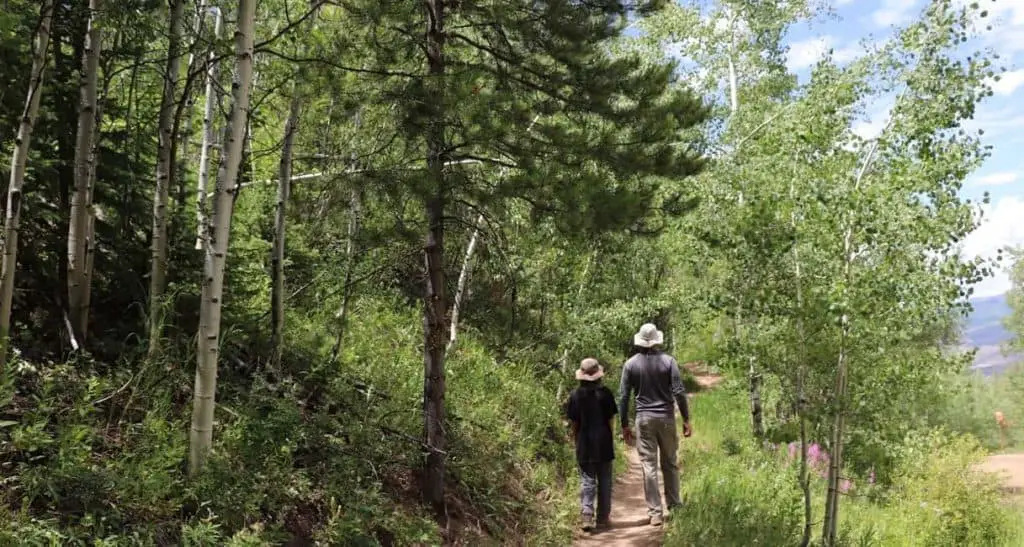
1. How much water does your body use while hiking?
More than how much water to bring on your hike, what you really need to know is how much water your body will consume on your hike. This will give you a better idea of how much water you will need to bring with you.
It is not practicable to precisely monitor your water loss while hiking along a trail. You would need to keep track of how much water or fluids you are consuming and your body weight.
What you can do is measure your personal water loss rate while on a training hike. This got me curious so I decided to run a quick experiment.
I just walked seven miles in 90 minutes in South Texas in early November. That is a pace of 4.67 miles per hour which is faster than my usual hiking pace of about 3 miles per hour.
It was sunny and a pleasant 80 degrees Fahrenheit, with 42 % humidity, and winds at less than 5 miles per hour. So how much water did my body lose? Here are the steps you can take to repeat this experiment for yourself.
- Weigh yourself with zero clothing.
- Go on a timed walk at a brisk pace that you can maintain.
- Remove your clothing and dry off any perspiration.
- Reweigh yourself.
- The difference in weight is roughly the amount of water weight that you have lost.
Of course, the difference in weight is not entirely attributable to water loss but this calculation will give you an estimate of how much water and fluids you will need to consume over time while hiking.
My experiment found that I lost 2 pounds (0.9 liters) of water on my 90-minute hike! I was not sweating profusely. We know that water weighs about 8.5 pounds per gallon or exactly 1 kilogram per liter. Yes, the metric system makes way more sense.
Since one pound of water is equal to about 15.3 ounces, this means I lost about 30.6 ounces of water. This is just less than four cups of water or half of the recommended daily intake of water for an average adult. And, I lost all of that in 90 minutes of brisk walking.
With this information, I can now gauge how much water I will lose on a hike given the length of the hike and how long it will take me. To calculate how many miles you can hike per hour check out my blog post.
We are going to the Big Bend National Park in December to get in some day hiking. I hope to summit Emory Peak which is a 10.5 mile hike. Since I know I lose about four cups of water for every 90 minutes of hiking, I can now calculate how much water I will lose to climb up Emory Peak and back.
At a pace of three miles per hour, I should be able to complete the 10.5 mile Emory Peak trail in less than four hours. I know that I lose about four cups of water in 90 minutes (2.67 cups per hour) while hiking, so I can expect to lose 10.68 cups of water over the course of the four-hour hike.
My recommendation at the top of this post is to carry one gallon of water for an average day hike. There are 16 cups in a gallon of water. My hike to the top of Emory Peak is only going to take me four hours so I don’t really need a full gallon.
Knowing how much water to bring on your hike will depend on a number of factors but you can start by calculating your average water loss per hour while hiking. If you can afford the extra weight it is always good to bring more water than you think you might need.
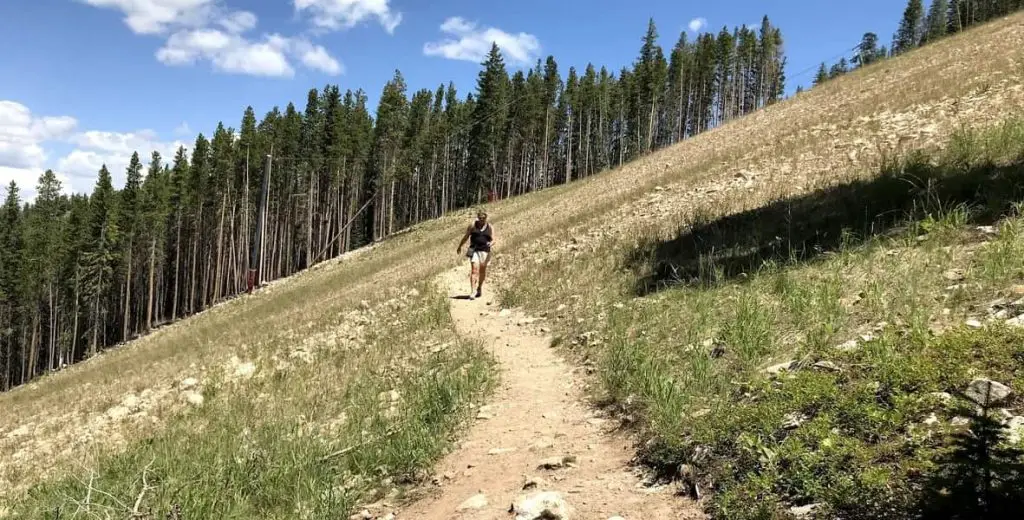
2. How your body loses water during a hike.
While I was on my water-loss experimental hike earlier today, I did not sweat profusely, and yet I lost two pounds of weight or about half of the recommended daily intake of water. How did I lose so much water while only sweating a little bit?
We lose water in three ways: perspiration, respiration, and using the toilet, either as urine or feces. Since I did not take a potty break on my experimental hike, I lost two pounds of water through sweating (perspiration) and breathing (respiration).
As you hike your large leg muscles produce heat. In order to maintain your body temperature, you naturally produce sweat which evaporates and cools your skin. You can influence the effectiveness of this process by the clothing that you wear and your overall fitness.
In a hotter environment, you should use light-colored clothing that covers your body. This will reduce the amount of sweat that you lose as your body seeks to maintain its temperature. This is why nomadic peoples in deserts wear long, loose-fitting robes. This helps their bodies conserve water.
The second major pathway through which your body loses water is through physiological respiration as you inhale and exhale. The relative amount of water that you lose while hiking might be more dependent on respiration if you are hiking in cooler temperatures where you will tend to sweat less.
3. How terrain affects water loss during a hike.
You can begin to see how certain factors can dramatically affect your water loss rate while hiking. I calculated today that at near sea level and with warm temperatures and moderate humidity I lose about 2.67 cups of water per hour.
While I was hiking in Peru in cooler weather at elevations between 14,000 to 17,000 feet or more I lost much more water. I was not sweating but I was really breathing hard to bring enough oxygen to my muscles. You can check out my Peru hike here.
All other factors being held constant, you will tend to lose more water at higher elevations because you will be breathing more frequently. Consider this when you plan on how much water to bring with you.
Steep and uneven terrains are more challenging and will cause you to exert more energy, causing you to lose more water through either perspiration or respiration. For a steeper hike with more elevation gain, you will lose more water. It would be best if you planned to carry more than you would for an easier, flatter hike.
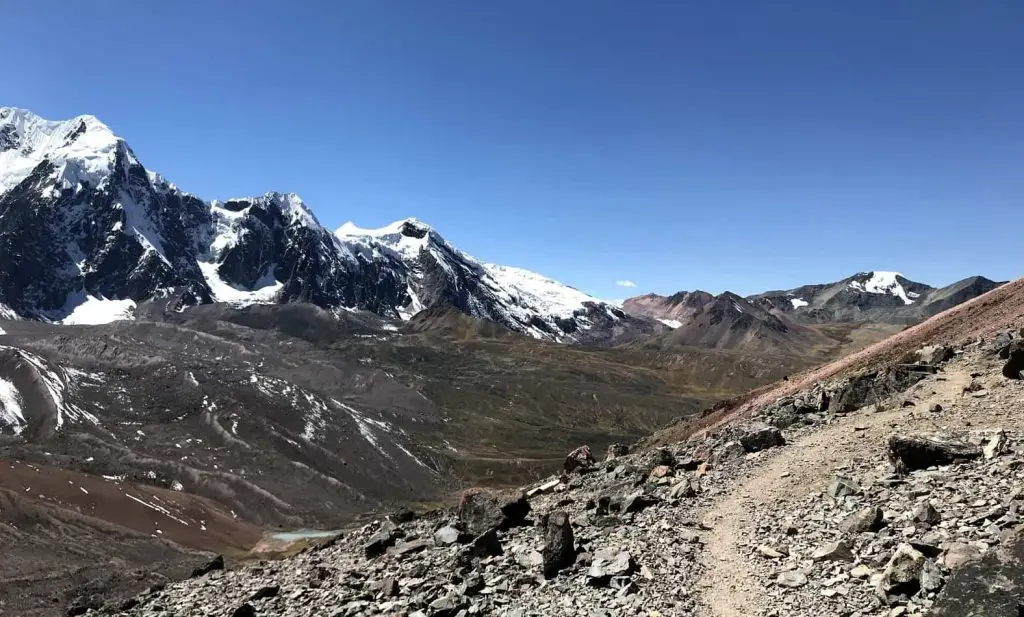
4. How weather affects water loss during a hike.
We know that we are losing water on a hike through sweating and breathing. So how might weather affect these processes and how much water we should plan to bring on our hikes?
Humidity is a big factor to consider when you are trying to calculate how much water to bring on a hike. If today I lost 2 pounds of water in 90 minutes of brisk hiking at 80 F and 42 % humidity, what would have happened if there had been 50%, 60%, or even 70% humidity?
Higher humidity will cause your normal sweating process to work harder since the cooling evaporation process will be less effective. Your sweat will evaporate less in the more humid air. Therefore, you will tend to sweat more in humid conditions to overcome this situation. This will cause you to lose more water more quickly and so you should factor this in when considering how much water to bring with you on a hike.
Temperature is an obvious factor in water loss. Since sweating is designed to cool your body down, it is obvious that higher temperatures will tend to elicit a greater sweat response from your body to maintain its temperature. I am acclimatized to South Texas and so 80F for me today was mild.
Each person will respond differently to higher temperatures, but everyone will need to consume more water while hiking. Cold weather also diminishes the thirst response tricking you into a false sense of security.
Frigid temperatures will increase water loss, mostly through respiration. Cold air does not contain as much water vapor, and so as you breathe, you will tend to lose more water through respiration than you would in moderate temperatures.
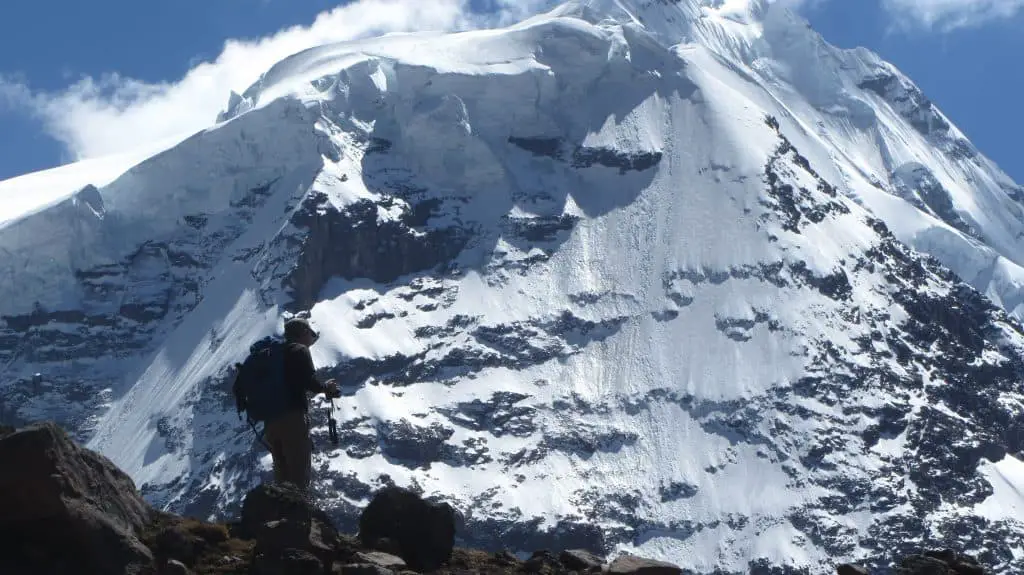
5. Water consumption tips for hikers.
So far, we have seen that for a four-hour hike under average conditions, I will tend to lose about 10.68 cups of water through perspiration and respiration. It seems logical then that I should bring this much water with me for my hike to the top of Emory Peak in the Big Bend National Park next month. But do I really need to bring that much water?
Now 10.68 cups of water are about 2.5 liters or about 0.67 gallons, and it weighs roughly 2.5 kilograms or 5.5 pounds. I can certainly carry this weight, but what if I was going on a 12-hour hike in hot weather? I might need three or four times the amount of water. Do I really need to carry 20 pounds of water with me?
You can avoid carrying all of the water with you that you think you might lose through perspiration and respiration by filling up your body before you start the hike.
I suggest drinking at least a liter of water before you start the hike. In any case, your urine should be clear before you start the hike. This will reduce the amount of water that you need to carry with you. How much is dependent upon several factors as we saw above, such as weather and terrain.
I suggest drinking continuously on your hike so that your water supply is running low by the time you finish the hike. Too often, hikers will conserve their water or forget to drink it.
Drinking continuously ensures that you are replacing the water that you are losing. If you have calculated your water loss rate as I did, then that number should be your water consumption target each hour over your hike. For me, that is about 2.67 cups per hour in normal conditions. If it is much hotter, higher elevation, or very humid, I will need to increase that amount.
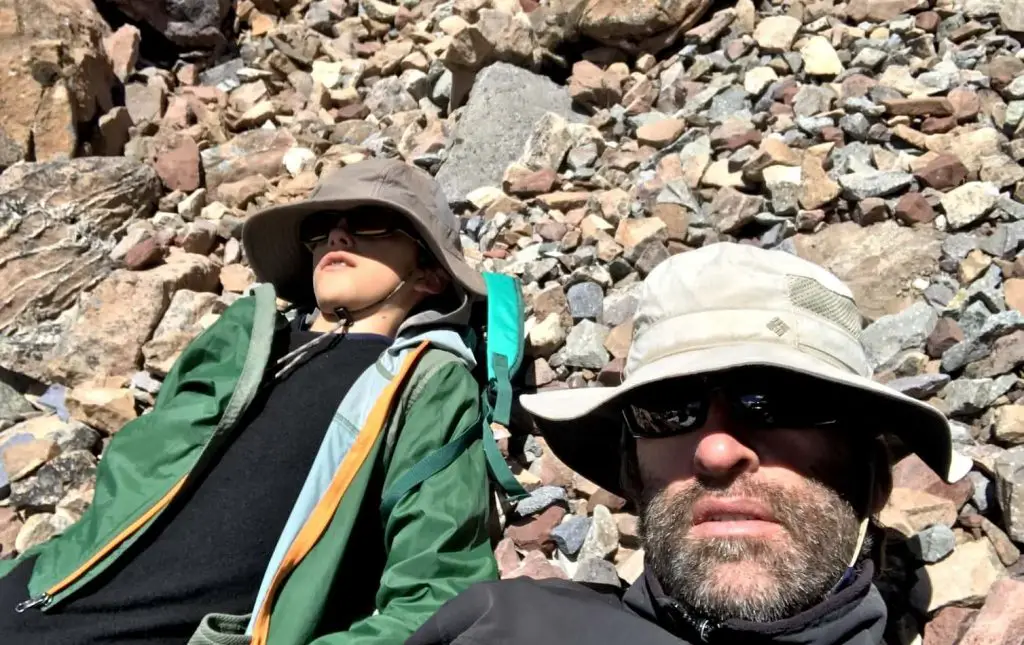
6. Should I carry water or a sports drink while hiking?
Electrolytes! When I was running the Rome marathon in 1996 it was a warm, March day with lots of sunshine. At about mile 23 the route ascends a hill up to the Villa Borghese city park. An elite runner was ahead of me and she was wobbling sideways. She appeared to have a big electrolyte issue.
So far, this discussion about hiking and water has been written as if you take in water and lose water. The reality is that you lose much more than just water, especially through perspiration. Sweat is mostly water, but it also contains trace amounts of salt, protein, urea, ammonia, and other substances.
While hiking, losing trace amounts of minerals through sweat, and not replacing them can cause problems like fatigue and disorientation. As a rule of thumb, if you expect to go on a long hike in hot weather, supplementing your water with a sports drink is probably a wise move.
Knowing how much water you lose per hour of hiking under normal conditions is useful to gauge how much water you will need to bring with you on a hike. I recommend a gallon of water or roughly 3.6 liters for a typical hiker on a typical day hike. This amount will vary depending upon several factors, such as fitness, terrain, and weather.

